Contents
List of Figures
Guide
Pagebreaks of the print version
NEW DIRECTIONS IN SCANDINAVIAN STUDIES
ANDY NESTINGEN, SERIES EDITOR
NEW DIRECTIONS IN SCANDINAVIAN STUDIES
This series offers interdisciplinary approaches to the study of the Nordic region of Scandinavia and the Baltic States and their cultural connections in North America. By redefining the boundaries of Scandinavian studies to include the Baltic States and Scandinavian America, the series presents books that focus on the study of the culture, history, literature, and politics of the North.
Small States in International Relations, edited by Christine Ingebritsen, Iver B. Neumann, Sieglinde Gstohl, and Jessica Beyer
Danish Cookbooks: Domesticity and National Identity, 16161901, by Carol Gold
Crime and Fantasy in Scandinavia: Fiction, Film, and Social Change, by Andrew Nestingen
Selected Plays of Marcus Thrane, translated and introduced by Terje I. Leiren
Munchs Ibsen: A Painters Visions of a Playwright, by Joan Templeton
Knut Hamsun: The Dark Side of Literary Brilliance, by Monika agar
Nordic Exposures: Scandinavian Identities in Classical Hollywood Cinema, by Arne Lunde
Icons of Danish Modernity: Georg Brandes and Asta Nielsen, by Julie K. Allen
Danish Folktales, Legends, and Other Stories, edited and translated by Timothy R. Tangherlini
The Power of Song: Nonviolent National Culture in the Baltic Singing Revolution, by Guntis midchens
Church Resistance to Nazism in Norway, 19401945, by Arne Hassing
Christian Krohgs Naturalism, by ystein Sjstad
Fascism and Modernist Literature in Norway, by Dean Krouk
Sacred to the Touch: Nordic and Baltic Religious Wood Carving, by Thomas A. DuBois
Smi Media and Indigenous Agency in the Arctic North, by Thomas A. DuBois and Copplie Cocq
The Swedish Theory of Love: Individualism and Social Trust in Modern Sweden, by Henrik Berggren and Lars Trgrdh, translated by Stephen Donovan
The Swedish Theory of Love
INDIVIDUALISM AND SOCIAL TRUST IN MODERN SWEDEN
Henrik Berggren and Lars Trgrdh
Translated by Stephen Donovan
UNIVERSITY OF WASHINGTON PRESS
Seattle
The Swedish Theory of Love was made possible in part by support from the Department of Scandinavian Studies at the University of Washington.
The cost of this translation was defrayed by a subsidy from the Swedish Arts Council, gratefully acknowledged.
Originally published as r svensken mnniska? Gemenskap och oberoende i det moderna Sverige
Henrik Berggren, Lars Trgrdh 2006, 2015
Norstedts Frlag, Stockholm
English language edition 2022 by Stephen Donovan
Composed in SabonLTStd-Roman, typeface designed by Jan Tschichold
262524232254321
Printed and bound in the United States of America
All rights reserved. No part of this publication may be reproduced or transmitted in any form or by any means, electronic or mechanical, including photocopy, recording, or any information storage or retrieval system, without permission in writing from the publisher.
UNIVERSITY OF WASHINGTON PRESS
uwapress.uw.edu
Library of Congress Cataloging-in-Publication Data
Names: Berggren, Henrik, author. | Trgrdh, Lars, author. | Donovan, Stephen, 1970 translator.
Title: The Swedish theory of love : individualism and social trust in modern Sweden / Henrik Berggren, and Lars Trgrdh; translated by Stephen Donovan.
Other titles: r svensken mnniska? English
Description: Seattle : University of Washington Press, [2022] | Series: New directions in Scandinavian studies | r svensken mnniska? Gemenskap och oberoende I det moderna Sverige Henrik Berggren, Lars Trgrdh 2006, 2015 Norstedts frlag, Stockholm. | Includes bibliographical references and index.
Identifiers: LCCN 2022013786 | ISBN 9780295750545 (hardback) | ISBN 9780295750552 (paperback) | ISBN 9780295750569 (ebook)
Subjects: LCSH: National characteristics, Swedish. | SwedenIntellectual life. | IndividualismSwedenHistory.
Classification: LCC DL639 .B4513 2022 | DDC 814/.52dc24
LC record available at https://lccn.loc.gov/2022013786
 This paper meets the requirements of ANSI/NISO Z39.48-1992 (Permanence of Paper).
This paper meets the requirements of ANSI/NISO Z39.48-1992 (Permanence of Paper).
CONTENTS
PREFACE
A Homecoming of Sorts
This book began in the mid-1980s when we met as graduate students in history at the University of California, Berkeley. Although we were both Swedish by birth, we also felt very American. One of us had spent parts of his childhood and adolescence in Wisconsin and New York; the other had left Sweden in his late teens to study and eventually settle in California. Having between us accumulated almost a lifetime of experience in both Sweden and the United States, we found our conversations repeatedly coming back to the cultural and political differences between the two countries.
Among our favorite topics was the issue of individualism. There is no denying that American culture has at its heart the idea of self-sufficient individuals making their way in the world by their own efforts. And yet we also felt that there was something lopsided about this rugged individualism. It concerns itself almost exclusively with a suspicion of the state as a threat to individual freedoms and far less with intermediate institutions that leave Americans more dependent on the family, charities, and communities in civil society than is the case in Sweden.
The extent of this difference between the United States and Sweden was brought home to us very clearly when we applied for financial aid from US universities. To be eligible for support, we had to disclose not only our own but also our parents economic resources. This felt very strange. As we saw it, we were grown-up, if young, independent adults, and our relationships to our parents, not least the economic ones, were nobodys business but our own. The reason we saw it this way was that in Sweden, state grants and loans are given to students as autonomous individuals and not as dependent family members. As a consequence, in Sweden neither parents nor spouses have any economic say in deciding whether someone goes to college and certainly no influence over whether they major in economics or study medieval ballads.
In this sense, socialist Sweden was more individualistic than the United States. This forced us to think more deeply about the different forms individualism can take. Our discussions gained further impetus in the 1990s when we both lived on and off in Germany. We came to realize that Germany differed from both Sweden and the United States. Germanys welfare system was almost as extensive as that in Sweden, but it was geared not toward the individual citizen but the family as a collective unit. At the same time, Germany also presented a contrast to the United States in that the state was considered not a threat to the family or to the intermediate institutions in civil society but, rather, a partner in the distribution of social rights such as education, health care, and elder care.
Ultimately, these rambling exchanges resulted in a book that was published in Sweden in 2006, r svensken mnnniska? Gemenskap och oberoende i det moderna Sverige (a hard title to translate into English, but literally it means Is the Swede Human? Community and Independence in Modern Sweden

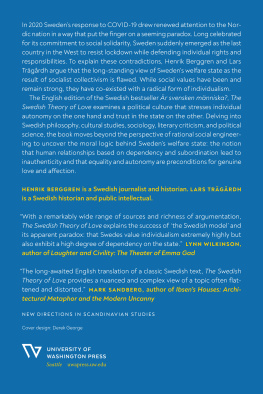




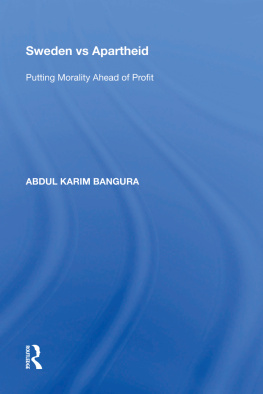
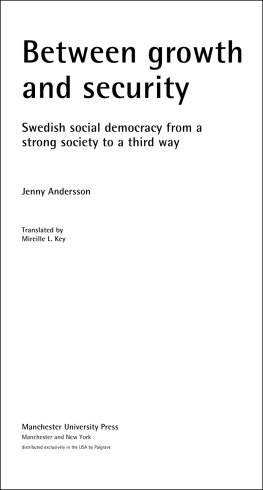

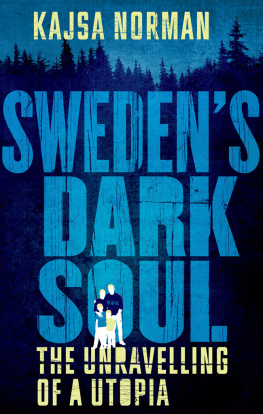

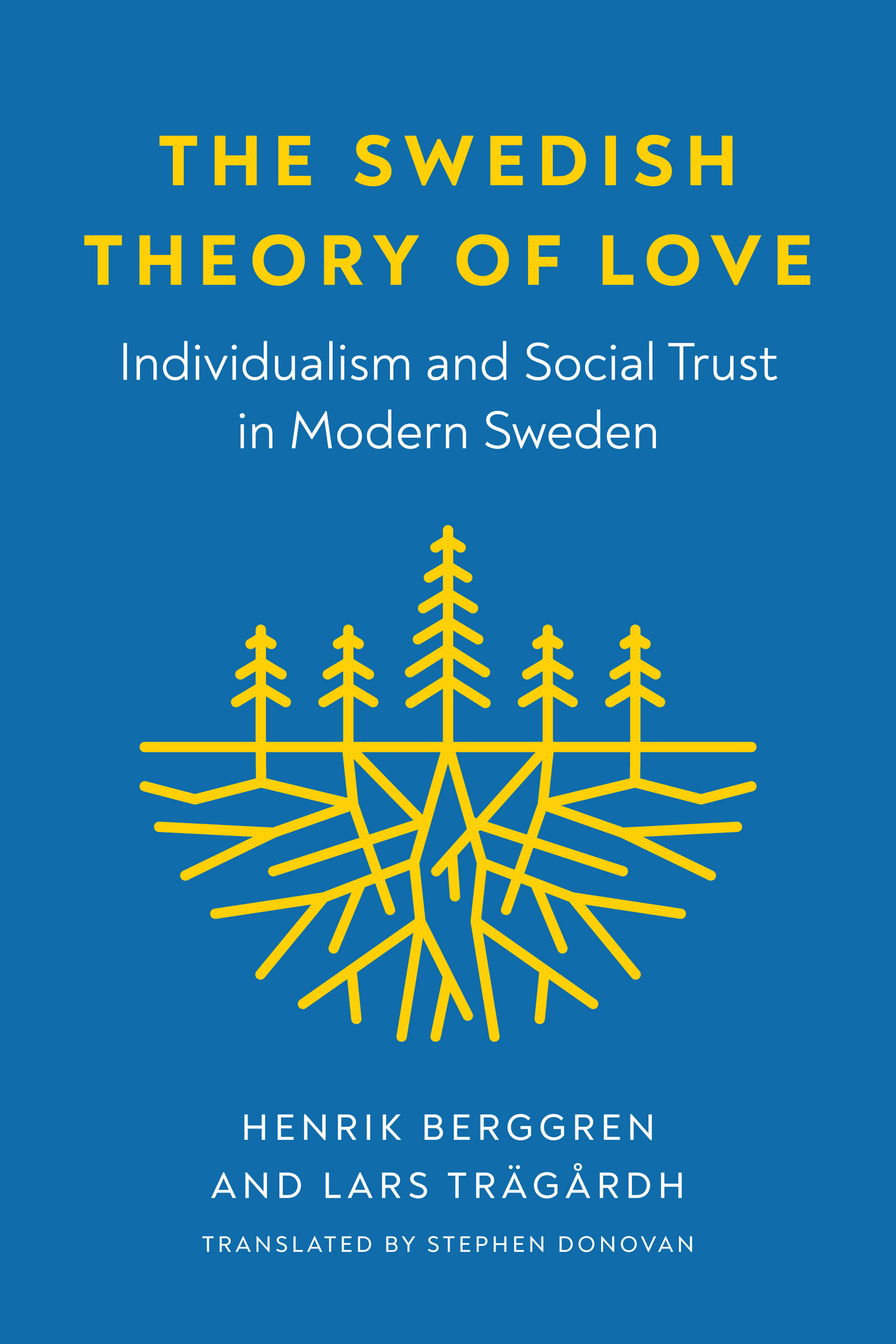
 This paper meets the requirements of ANSI/NISO Z39.48-1992 (Permanence of Paper).
This paper meets the requirements of ANSI/NISO Z39.48-1992 (Permanence of Paper).